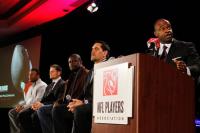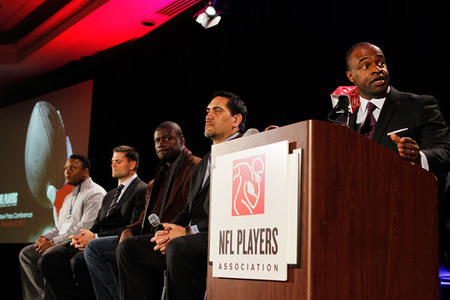 Slow motion is better than no motion (that’s what she said) and that’s what NFL and NFL players union are banking on by allowing Federal mediation as a possible means of settling their labour dispute.
Slow motion is better than no motion (that’s what she said) and that’s what NFL and NFL players union are banking on by allowing Federal mediation as a possible means of settling their labour dispute.
The Federal Mediation and Conciliation Service announced today that the NFL and NFL’s player union had agreed to allow the agency to be involved in the negotiations. But don’t expect to hear any details from the agency about the proceedings.
George H. Cohen, the agency’s director was quoted in the Washington Post, saying
“I have had separate, informal discussions with the key representatives of the National Football League and the National Football League Players Association during the course of their negotiations for a successor collective bargaining agreement,” Cohen said in a written statement. “At the invitation of the FMCS, and with the agreement of both parties, the ongoing negotiations will now be conducted under my auspices in Washington, D.C., commencing Friday, February 18…Due to the extreme sensitivity of these negotiations and consistent with the FMCS’s long-standing practice, the Agency will refrain from any public comment concerning the future schedule and/or the status of those negotiations until further notice.”
With the March “almost midnight” on the 3rd, deadline quickly approaching to hammer out a new CBA, this is probably the best-case scenario for both sides, particularly the players. The Federal Mediation and Conciliation Service is a federal agency created in 1947 to promote cooperative labor resolutions, and cooperating isn’t exactly an activity the owners and players are the best at doing.
Just earlier this week, the NFL filed a grievance to the National Labour Relations Board, claiming the union was refusing to bargain in good faith. And back and forth it has gone as both sides definitely don’t trust each other. To put it plainly, there’s going to be a lot of bad blood and hurdles to cross for the Federal Mediator in dealing with both parties.
Of course, the gambling industry will be keeping a close eye on how these proceedings play out. Obviously, just as much as the fans would hate a lockout, bettors would hate one even more, which means the gaming industry needs an NFL lockout like we all need wooden legs and holes in our heads.
